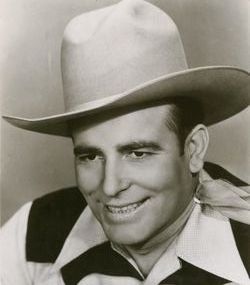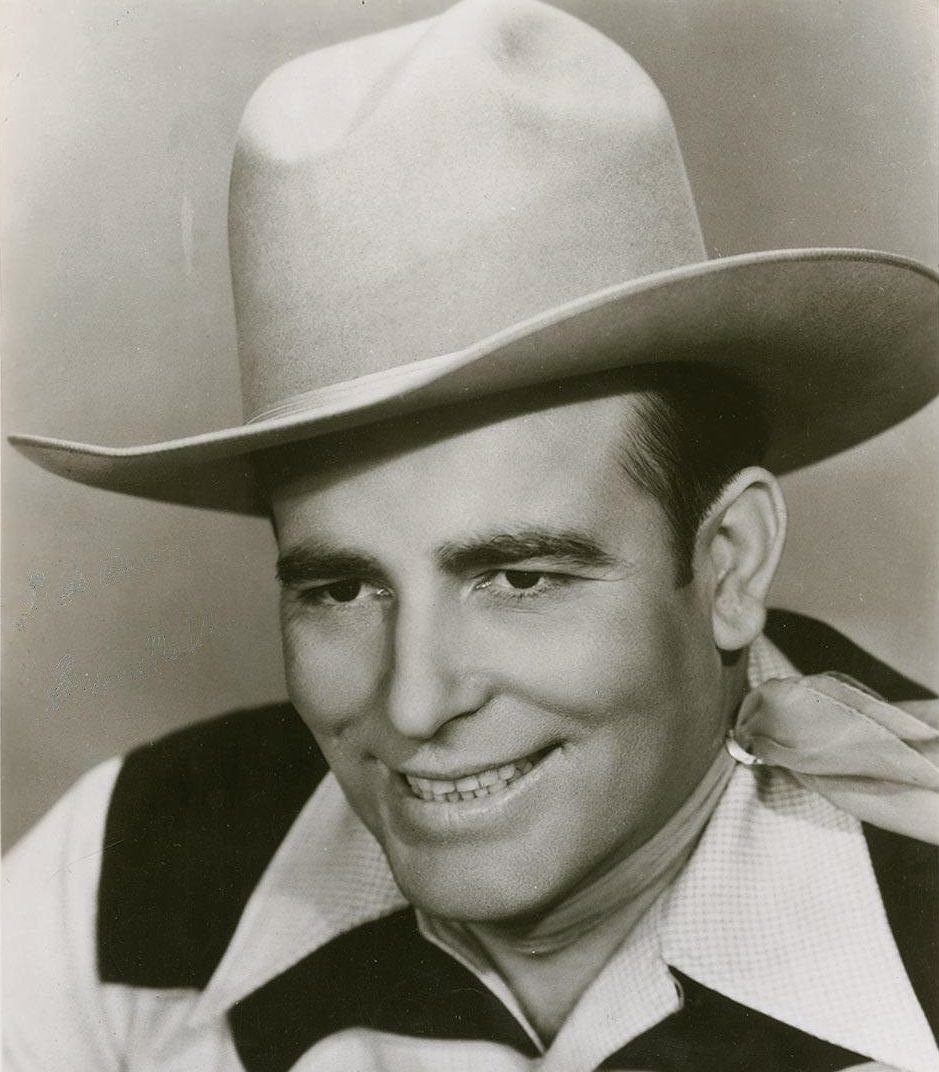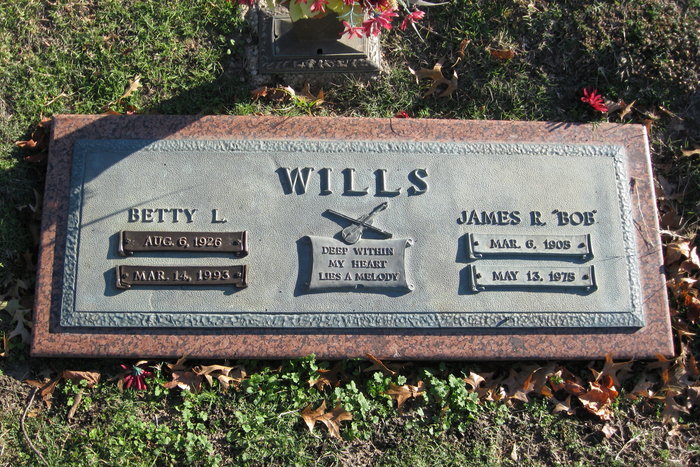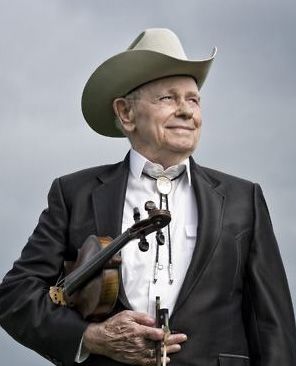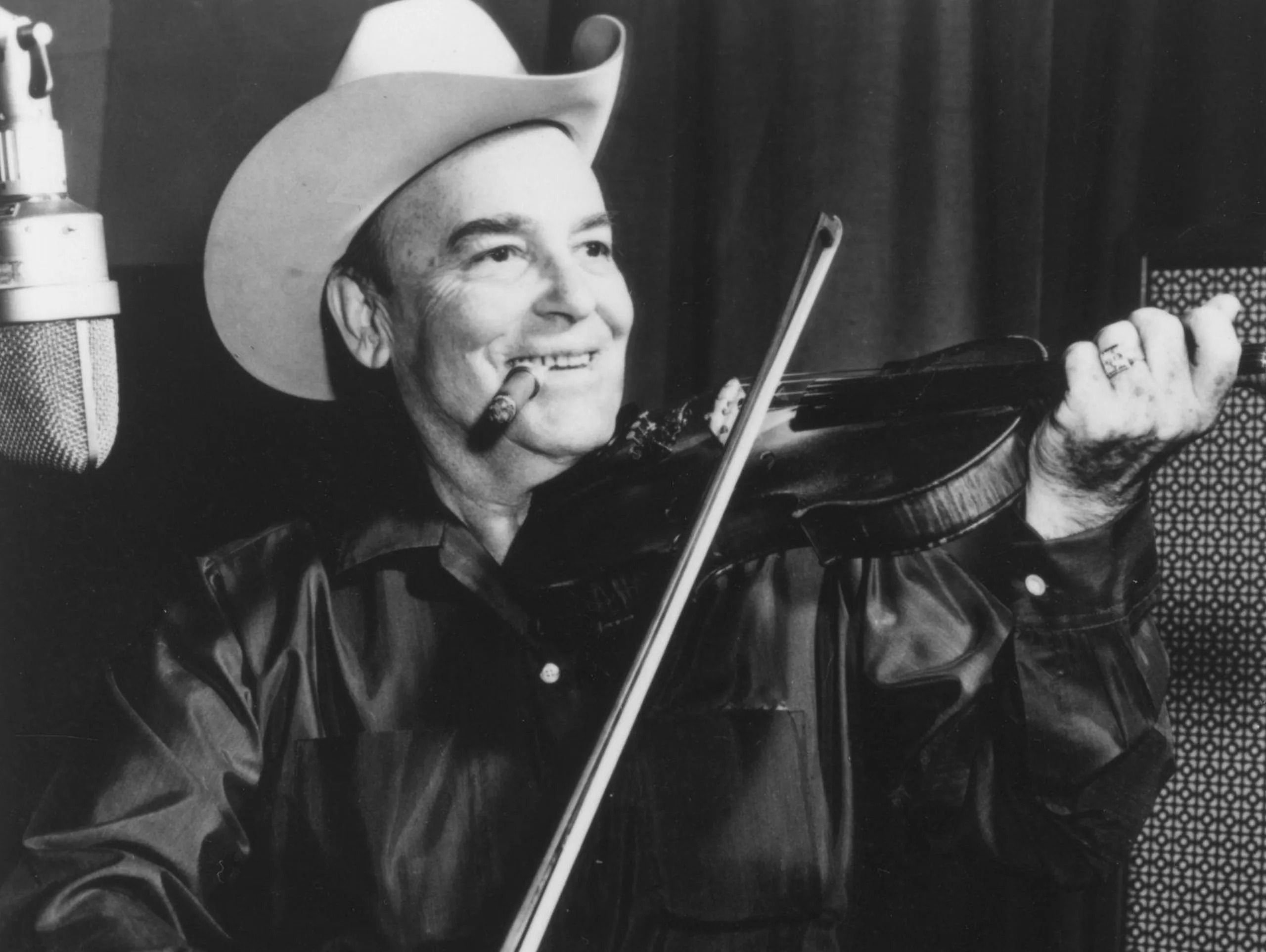Country Music Singer, Songwriter, Fiddler and Bandleader. Known as the "King of Western Swing", he is considered by music authorities (historians, musicologists & critics) as the co-founder of Western swing. Born on a cotton farm in Kosse, Texas, his father raised cotton and was a Texas champion fiddle player. He grew up in a musical family and learned to play the fiddle and mandolin at an early age and the family often held country dances in their home. At the age of 16, he left the family and drifted for several years, traveling from town to town to try to earn a living. He attended barber school and moved first to Roy, New Mexico, then returned to Turkey, Texas to work as a barber. In 1929, he moved to Fort Worth, Texas where he played in minstrel and medicine shows, and continued to work as a barber. After meeting Herman Arnspinger, they formed the Wills Fiddle Band, later changing the name to the Light Crust Doughboys and added singer Tommy Duncan in 1932. In 1934, he formed a new band called The Playboys and they traveled to Oklahoma City, Oklahoma and shortly afterward to Tulsa, Oklahoma, and began broadcasting noontime shows over radio station KVOO and changed the band's name to the Texas Playboys. Their popularity grew and he added a trumpeter and saxophone player to the group. By 1935, he had added horn and reed players, a piano player, a steel guitarist, as well as drums to the Playboys. The addition of steel guitar whiz Leon McAuliffe in March 1935 added not only a formidable instrumentalist but a second engaging vocalist. He favored jazz-like arrangements and the band found national popularity into the 1940s with such hits as "Steel Guitar Rag", "New San Antonio Rose" (which sold over a million records and became the band's signature song), "Smoke on The Water", "Stars And Stripes On Iwo Jima", and "New Spanish Two Step". In 1940, he and his band co-starred with Tex Ritter in the film "Take Me Back To Oklahoma". His other film credits include "The Lone Prairie" (1942), "Riders Of The Northwest Mounted" (1943), "Saddles And Sagebrush" (1943), "The Vigilantes Ride" (1943), "The Last Horseman" (1944), "Rhythm Round-Up" (1945), "Blazing The Western Trail" (1945), and "Lawless Empire" (1945). In December 1942, after several band members had left the group, and as World War II raged, he joined the US Army received a medical discharge in 1943. He then moved to Hollywood, California, reorganized the Texas Playboys, and broadcast through the week over radio station KMTR-AM (now KLAC) in Los Angeles, California and played regularly every Friday, Saturday, and Sunday night at the Mission Beach Ballroom in San Diego, California. In November 1944 he and the Playboys began first cross-country tour and appeared at the Grand Ole Opry in Nashville, Tennessee. The following year he moved to Fresno, California and opened the Wills Point nightclub in Sacramento and continued touring the Southwest and Pacific Northwest from Texas to Washington State. His dances were outdrawing those of legendary bandleaders Benny Goodman and Tommy Dorsey. While based in Sacramento, his broadcasted over radio station KFBK which was heard all over the West. In the late 1940s he and the Playboys recorded the hits "Roly Poly", "Stay A Little Longer", "Sugar Moon", and "Bubbles In My Beer". By that time his binge drinking made him increasingly unreliable, which caused a rift with Tommy Duncan. It ended when he fired Duncan in the fall of 1948. The following year moved back to Oklahoma City and went back on the road to maintain his payroll and his dance club Wills Point. He opened a second club, the Bob Wills Ranch House in Dallas, Texas. Turning the club over to managers later revealed to be dishonest, left him in desperate financial straits with heavy debts to the Internal Revenue Service for back taxes that caused him to sell many of his assets. In 1950 he had two Top 10 hits, "Ida Red Likes The Boogie" and "Faded Love". After 1950 radio stations began to increasingly specialize in one form or another of commercially popular music. Although labeled "country and western", he did not fit into the popular Nashville country and western stations and while he frequently played pop music, he was not accepted in the pop music world. He continued to tour and record through the 1950s into the early 1960s, despite the fact that Western swing's popularity, even in the Southwest, had greatly diminished. After suffering two heart attacks in 1965, he dissolved the Texas Playboys to perform solo with house bands. While he did well in Las Vegas and other areas, and made records for the Kapp Records label, he was largely a forgotten figure. In 1969 he suffered a stroke which paralyzed his right side and ended his career. By 1971 he recovered sufficiently to travel occasionally and appear at tribute concerts and in December 1973 he participated in a final 2-day reunion session with members of some the Texas Playboys to record an album. During this time he suffered another stroke, followed by a more severe one a few days later and became comatose, and the musicians completed the album "For The Last Time" without him. He lingered for five months and died of pneumonia at the age of 70. In 1968, he was inducted into the Country Music Hall of Fame, the Nashville Songwriters Hall of Fame in 1970, the Rock and Roll Hall of Fame in the Early Influence category along with the Texas Playboys in 1999, and received the Grammy Lifetime Achievement Award in 2007. In 2003, he was ranked number 27 in Country Music Television's 40 Greatest Men in Country Music.
Country Music Singer, Songwriter, Fiddler and Bandleader. Known as the "King of Western Swing", he is considered by music authorities (historians, musicologists & critics) as the co-founder of Western swing. Born on a cotton farm in Kosse, Texas, his father raised cotton and was a Texas champion fiddle player. He grew up in a musical family and learned to play the fiddle and mandolin at an early age and the family often held country dances in their home. At the age of 16, he left the family and drifted for several years, traveling from town to town to try to earn a living. He attended barber school and moved first to Roy, New Mexico, then returned to Turkey, Texas to work as a barber. In 1929, he moved to Fort Worth, Texas where he played in minstrel and medicine shows, and continued to work as a barber. After meeting Herman Arnspinger, they formed the Wills Fiddle Band, later changing the name to the Light Crust Doughboys and added singer Tommy Duncan in 1932. In 1934, he formed a new band called The Playboys and they traveled to Oklahoma City, Oklahoma and shortly afterward to Tulsa, Oklahoma, and began broadcasting noontime shows over radio station KVOO and changed the band's name to the Texas Playboys. Their popularity grew and he added a trumpeter and saxophone player to the group. By 1935, he had added horn and reed players, a piano player, a steel guitarist, as well as drums to the Playboys. The addition of steel guitar whiz Leon McAuliffe in March 1935 added not only a formidable instrumentalist but a second engaging vocalist. He favored jazz-like arrangements and the band found national popularity into the 1940s with such hits as "Steel Guitar Rag", "New San Antonio Rose" (which sold over a million records and became the band's signature song), "Smoke on The Water", "Stars And Stripes On Iwo Jima", and "New Spanish Two Step". In 1940, he and his band co-starred with Tex Ritter in the film "Take Me Back To Oklahoma". His other film credits include "The Lone Prairie" (1942), "Riders Of The Northwest Mounted" (1943), "Saddles And Sagebrush" (1943), "The Vigilantes Ride" (1943), "The Last Horseman" (1944), "Rhythm Round-Up" (1945), "Blazing The Western Trail" (1945), and "Lawless Empire" (1945). In December 1942, after several band members had left the group, and as World War II raged, he joined the US Army received a medical discharge in 1943. He then moved to Hollywood, California, reorganized the Texas Playboys, and broadcast through the week over radio station KMTR-AM (now KLAC) in Los Angeles, California and played regularly every Friday, Saturday, and Sunday night at the Mission Beach Ballroom in San Diego, California. In November 1944 he and the Playboys began first cross-country tour and appeared at the Grand Ole Opry in Nashville, Tennessee. The following year he moved to Fresno, California and opened the Wills Point nightclub in Sacramento and continued touring the Southwest and Pacific Northwest from Texas to Washington State. His dances were outdrawing those of legendary bandleaders Benny Goodman and Tommy Dorsey. While based in Sacramento, his broadcasted over radio station KFBK which was heard all over the West. In the late 1940s he and the Playboys recorded the hits "Roly Poly", "Stay A Little Longer", "Sugar Moon", and "Bubbles In My Beer". By that time his binge drinking made him increasingly unreliable, which caused a rift with Tommy Duncan. It ended when he fired Duncan in the fall of 1948. The following year moved back to Oklahoma City and went back on the road to maintain his payroll and his dance club Wills Point. He opened a second club, the Bob Wills Ranch House in Dallas, Texas. Turning the club over to managers later revealed to be dishonest, left him in desperate financial straits with heavy debts to the Internal Revenue Service for back taxes that caused him to sell many of his assets. In 1950 he had two Top 10 hits, "Ida Red Likes The Boogie" and "Faded Love". After 1950 radio stations began to increasingly specialize in one form or another of commercially popular music. Although labeled "country and western", he did not fit into the popular Nashville country and western stations and while he frequently played pop music, he was not accepted in the pop music world. He continued to tour and record through the 1950s into the early 1960s, despite the fact that Western swing's popularity, even in the Southwest, had greatly diminished. After suffering two heart attacks in 1965, he dissolved the Texas Playboys to perform solo with house bands. While he did well in Las Vegas and other areas, and made records for the Kapp Records label, he was largely a forgotten figure. In 1969 he suffered a stroke which paralyzed his right side and ended his career. By 1971 he recovered sufficiently to travel occasionally and appear at tribute concerts and in December 1973 he participated in a final 2-day reunion session with members of some the Texas Playboys to record an album. During this time he suffered another stroke, followed by a more severe one a few days later and became comatose, and the musicians completed the album "For The Last Time" without him. He lingered for five months and died of pneumonia at the age of 70. In 1968, he was inducted into the Country Music Hall of Fame, the Nashville Songwriters Hall of Fame in 1970, the Rock and Roll Hall of Fame in the Early Influence category along with the Texas Playboys in 1999, and received the Grammy Lifetime Achievement Award in 2007. In 2003, he was ranked number 27 in Country Music Television's 40 Greatest Men in Country Music.
Bio by: William Bjornstad
Inscription
DEEP WITHIN MY HEART LIES A MELODY
Family Members
Advertisement
See more Wills memorials in:
Explore more
Sponsored by Ancestry
Advertisement
